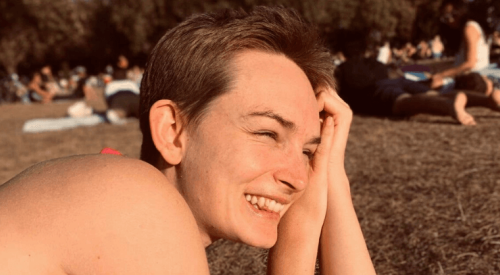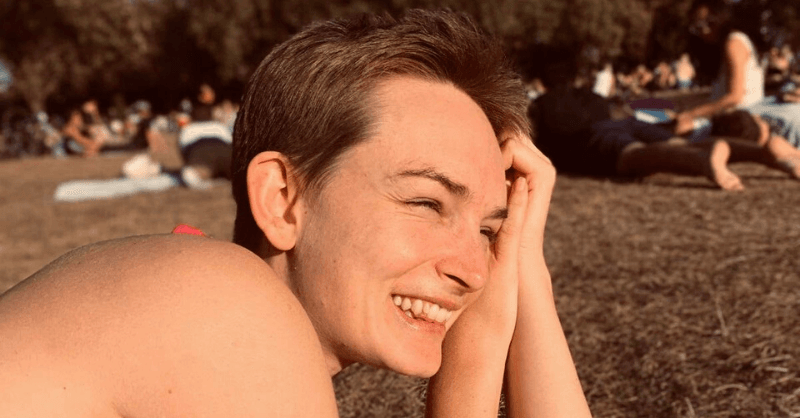
How hiding my bi identity affected my mental health

6 February is Time to Talk Day, an initiative by Time to Change that encourages everyone to be more open about mental health. Our Senior Campaigns Officer, Molly Maher, opens up about the mental health impact of experiencing biphobia, and the importance of community.
I think a lot of lesbian, gay, bi and queer people have that light bulb moment where you realise, you’re not straight. I had a few. When Emily and Naomi kissed on Skins, when I read an Agony Aunt column about having a crush on your best friend, when I met a proud, openly queer person for the first time – all these moments bought up feelings of excitement and dread.
I wanted to be myself, but I hoped and prayed that my feelings would go away, because I feared rejection.
Growing up I didn’t have the language to tell people I was bi. I knew I wasn’t only attracted to men but felt ashamed and had to hide it from my friends. At school, calling someone a lesbian was considered the worst insult, so I knew that if I came out, I’d risk losing people or being treated differently. That made me push down my feelings and hide parts of myself, even from myself.
I think that denying my experiences lead to anxiety and negatively affected my self-esteem. I couldn’t express, explore and embrace my full self.
Three in ten bi men (30 per cent) and almost one in ten bi women (8 per cent), say they cannot be open about their sexual orientation with any of their friends, compared to two per cent of gay men and one per cent of lesbians.
LGBT in Britain – Home and Communities (2018), p8
I recently facilitated a Bi Empowerment Programme, where we aim to empower attendees to celebrate what it means to them to be bi and build a collective sense of solidarity. It was incredible to spend time with other bi people and hear their stories. We talked about how biphobia had made us feel like we were not ‘queer enough,’ and how that had sparked or fed self-doubt, anxiety and depression.
It hurts when the community dismisses or attacks your identity as a bi person, pushes you to the fringes, stereotypes you or denies who you are as a ‘phase’ or a ‘lie.’ When I told gay and lesbian friends of mine that I was going to tell my parents I’m bi, they told me I should ‘check’ first by sleeping with a woman. When I look back at that, I’m disappointed that they would doubt me and put me down instead of raising me up the way I hoped they would. After all, I know myself better than anyone.
More than one in four bi women (27 per cent) and almost one in five bi men (18 per cent) have experienced discrimination or poor treatment from others in their local LGBT community because of their sexual orientation, compared to nine per cent of lesbians and four per cent of gay men.
LGBT in Britain – Home and Communities (2018), p13
I have experienced anxiety, depression and PTSD (Post Traumatic Stress Disorder); while my experiences of biphobia are only one thread running through my mental health challenges, they are inextricable from who I am and my wellness overall.
I’ve come on a journey of self-acceptance through therapy and by surrounding myself with LGBT and queer people who are supportive and affirming. If you can, reach out to friends, colleagues or family about your mental health or approach some of the amazing services out there, like Samaritans and LGBT+ Switchboard. You don’t have to be in crisis to reach out, and taking that step is courageous not weak. You deserve to be heard.
72 per cent of bi women and 56 per cent of bi men have experienced anxiety in the last year.
LGBT in Britain – Home and Communities (2018), p7
I hid my identity from myself and others for a long time. But after so many light bulb moments I hit a fork in the road: I could risk losing myself by staying in the closet, or risk losing others by coming out. I’m lucky that I had the option to come out safely, and in the end the people who matter to me most have become my greatest allies.
I see my route to mental wellness as a life-long journey of trying to show myself love and compassion, as well as listening and learning from the experiences of other people in our community. Challenging ourselves to show solidarity to other LGBT people, recognising when our views and attitudes reflect that we’re in a privileged position, and making an effort to include others can make our community safer and stronger.
Solidarity has helped me overcome the harmful myths of biphobia and take pride in being bi!
Do you want to help lesbian, gay, bi and trans people feel more included?